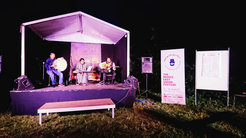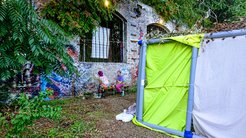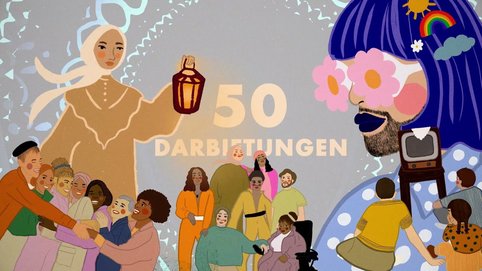Innovating Interfaith Dialogue between Jews and Muslims in Berlin
by Dekel Peretz
Blog | November 2021
Berlin a haven of art, culture and music festivals has in recent years become a home for another kind of festival that focuses on dialogue between Jews and Muslims. These festivals offer a refreshing take on interfaith dialogue and appeal to new audiences by shifting the dialogue from the religious sphere to culture, politics, arts and music. This is important because many Jews and Muslims don’t necessarily identify along religious lines. Further, going beyond the religious sphere allows participants to explore contemporary political themes and intersectional connections often relating to experiences of marginalization and migration. The ENCOUNTERS research project investigates both spontaneous encounters and organized dialogue, such as these festivals, in a comparison between six European cities: Berlin, London, Paris, Frankfurt, Manchester and Strasbourg to map how the interplay between national and local frameworks as well as grassroots initiatives, communal institutions and policy makers, shape Jewish-Muslim encounters.

With the easing of Covid-regulations in mid-2021 at least three dialogue festivals have taken place in the German capital this year. The festival season was launched in August with the Middle East Union Festival. This festival shifted the focus from religious categories to intellectual and cultural production originating in the Middle East, without drawing precisely the boundaries of this space. The festival was sponsored by a prestigious municipal cultural fund and curated by Mati Shemoelof and Hila Amit, Jewish-Israeli writers living in Berlin. In their works they emphasize their ancestry as Jews from Arab countries and past Jewish-Arab conviviality. They perceive Berlin as the ideal place to revive this conviviality. Berlin as an extraterritorial space that has purportedly overcome its sinister history symbolizes hope for the organizers. In a piece Shemoelof and Amit wrote for the online news blog Mondoweiss they quote Amro Ali, a researcher of Arab exile spaces: “Berlin is not just a city, it is a political laboratory that establishes a new kind of beginning.” In their eyes, Israelis in Berlin are a part of recent waves of exilés from the Middle East prompted by political and economic unrest. The festival’s organizers bring together exiled literary elites to envision a utopian Middle East to which they could imagine returning.

More immediately local concerns are what lie at the heart of the Festival of Resilience that took place in September for the second time. The festival commemorates the anniversary of the antisemitic and Islamophobic terrorist attack on a synagogue and a kebab shop in Halle on the highest Jewish holiday of Yom Kippur. It was founded by the Jewish student organization Hillel Germany and survivors who were in the synagogue during the attack and is supported by international Jewish philanthropy foundations and German foundations combating racism and antisemitism. While the festival is primarily geared towards a Jewish audience, emphasizing joint celebration of Jewish holidays such as Yom Kippur and Sukkot, it also embraces and hosts survivors and family members of victims of other far-right wing extremist attacks in Germany – especially of the Hanau attack, which happened just four months after Halle. The festival organizers seek to establish a shared survival culture through first-hand stories of survival and grief by Jews and Muslims thus fostering intersectional solidarity in a predominantly Jewish audience.
MuJew Festival trailer
The final festival for 2021 will be the MuJew Festival taking place for the first time in early November. This festival was initiated by Juma, an association of young Muslim activists which started a decade ago as a federally funded diversity-cultivation project and is now an independent association. The Juma initiators put together a coordination team in which Jews and Muslims are equally represented. Despite Juma not being a religious organization financial support for the festival comes from the municipal religious affairs department. The festival is intended to complement the numerous government-sponsored events marking the 1700 anniversary of Jewish life in Germany. By tying into this theme with its discursive tension between Jewish alterity and belonging the festival seeks recognition for the presence of Muslims – of the other “other” – in Germany too.
The three festivals briefly described in this post serve as an example for the kind of organized intercultural dialogue that the ENCOUNTERS research project focuses on in Berlin. It demonstrates the variety of civil society organizations and government agencies involved in Jewish-Muslim dialogue initiatives. Through connection with Berlin’s vibrant cultural scene these innovative festivals reach out to young members of these communities who do not necessarily define themselves along religious lines while appealing also to a general audience. The festivals programs and social circles sometimes overlap but there are important differences between the festivals, their initiators, and financial supporters. For example, the Middle East Union Festival places relationships between Israel and its Arab neighbors center stage, yet it still focuses on local networking between Berlin’s Israeli (not necessarily local Jewish) and Arab scenes. The other two festivals focus on building political alliances to fight antisemitism and islamophobia in Germany. Despite this distinction, the Middle East Union Festival also frames its goals within a German historical narrative in which the Holocaust plays an important role. Although this might partially emanate from the festival’s application for public funding, this seems to strengthen the argument that national narratives play an important role in encounters between Jews, Muslims and the majority society. Further, considering national narratives in the analysis is crucial, because as different as the approaches might be, all three festivals share the goal of establishing agency among Jewish and Muslim actors to shape public discourse about Jewish-Muslim relationships and the individual communities in Germany.











